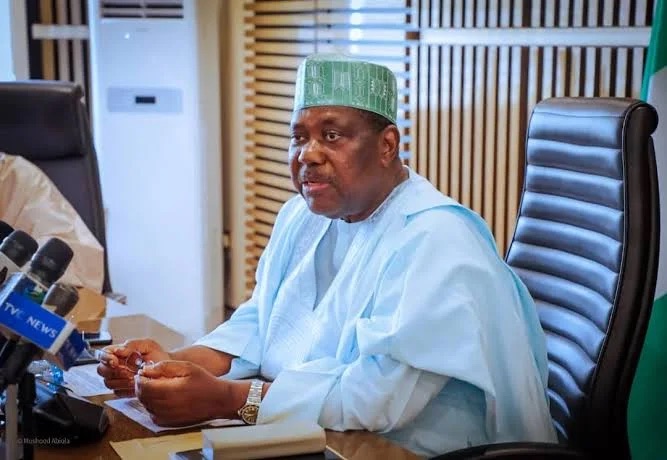From Juliana Taiwo-Obalonye, Abuja
Secretary to the Government of the Federation (SGF), Senator George Akume, has admonished politicians from the northern region to wait until 2031 to contest for president.
Akume’s remarks came against a backdrop of the ongoing national dialogue about power rotation and inclusion, important to Nigeria’s democratic stability and development.
Speaking at the government-citizen engagement event organised by the Ahmadu Bello Memorial Foundation in Kaduna, he stressed the importance of patience and unity for the country’s stability.
“Let me share with you what our leaders did in the 1999 pre-Jos Convention of the Peoples Democratic Party (PDP). They recognised, and rightly too, that the only way to ensure the unity and territorial integrity of our dear country was to entrench in our minds and practice rotational presidency between the South and the North,” he declared.
He paid tribute to the architects of the 1999 arrangement, including Chief Solomon Lar, Mallam Adamu Ciroma, Shehu Dan Musa, Abubakar Rimi, Prof Suleman Kumo, Isaac Shaahu, and Prof Jerry Gana, “Their wisdom has paid off. This arrangement guaranteed the stability of the polity.”
Akume clarified the practical implication, saying: “By this conception, the North, a region that is so dear to me, will be eligible for the presidency in 2031, not 2027. Nigeria will not cease to exist. But, we need patience to arrive at our turn.”
The rotational presidency arrangement, though not enshrined in the constitution, followed the 1999 founding political agreement by the PDP to alternate the presidency between Nigeria’s northern and southern regions, divided into six geo-political zones (North West, North Central, North East, South West, South South and South East). This system was devised to foster national unity and mitigate ethnic and religious tensions by ensuring balanced political power sharing.
Calling for collective national resolve, Akume said: “Let us walk this path together, with faith in our country and renewed hope in our shared future. So, we are all resolved in deepening our democracy.”
He praised President Tinubu’s administration for bold reforms and called on Nigerians to remain patient and united in pursuit of national renewal.
Honouring the legacy of Sir Ahmadu Bello, Akume described him as “a phenomenal being who promoted national cohesion and unity in Nigeria. He utilised his God-given talents, knowledge, position and power to drive development. He believed in a Nigeria that is united and indivisible. He embodied the values of compassion, wisdom, selflessness and integrity.”
Reflecting on the administration’s inception, he noted: “This administration assumed office on May 29, 2023, with a strong vision for our country under the renewed hope agenda. President Bola Tinubu had promised Nigerians impartiality in governance and a commitment to remodelling our economy, improving security, accelerating infrastructure, job creation and revitalising agriculture.”
He outlined eight priority areas guiding government policy, including reforming the economy, strengthening security, boosting agriculture, unlocking energy/resources, enhancing infrastructure, investing in health/education, accelerating diversification and improving governance.
“From the outset of this administration, President Tinubu adopted bold and foundational reforms to stabilise and grow the Nigerian economy. Among the steps, he unified the exchange rate, which enhanced transparency in forex management and boosted investor confidence. Nigeria’s GDP is on a trajectory of recovery and has shown signs of recovery beyond imagination; inflation is moderating and investor confidence is gradually improving.”
He acknowledged that “Nigeria’s security architecture is undergoing robust transformation and revamping. The government is also investing in human capital development and wellbeing of citizens so as to minimise insecurity.”
He pointed to key achievements, like the judicial reforms, local government autonomy, regional development commissions, renewed anti-corruption efforts and robust diplomacy and infrastructure drive.
“The Lagos-Calabar Coastal Highway, the Sokoto-Badagry Super Highway, the ongoing rail projects and housing initiatives, demonstrate the scale of ambition. The power sector reform roadmap is also revamping the national grid.”
He lauded the welfare, education and youth policies, saying: “Over 400,000 students have benefitted, while an estimated N53 billion has been disbursed through the Student Loan Act. Several young Nigerians now occupy strategic government roles.”
He acknowledged persistent challenges, saying, “The removal of fuel subsidy, though painful, has been a necessary reform that saved trillions of naira. The savings are now being redirected into critical infrastructure and human development while states are receiving increased allocations for development.”


